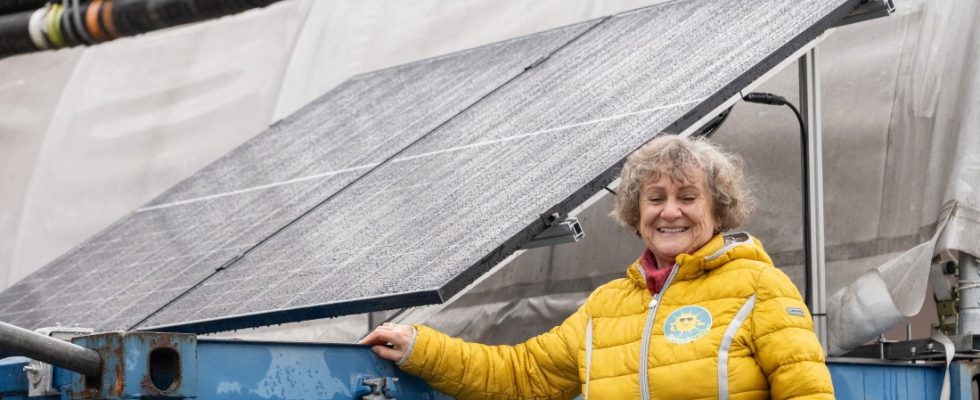People in need can usually pick up food donations from the Münchner Tafel. Now guests of the Tafel also have the opportunity to get something completely different: a solar power plant for the balcony. The Munich association Solar 2030 is collecting donations for this purpose. More than 5,000 euros have been raised so far in the “Balcony Power Plants for Everyone” campaign on the betterplace.org platform came together. The money will be used to pay for at least 20 of these solar systems.
The association officially handed over the first solar system to the board on Thursday. However, it is not on a balcony, but in the Tafel’s fleet on the grounds of the wholesale market in Sendling. It has recently started supplying electricity there, among other things, for the cooling systems of the vehicles used to transport food and for office workstations.
The Munich Tafel supplies 20,000 people per week, says board member Axel Schweiger. People can find help here if they can prove that they do not have more than 502 euros per month after deducting rent and additional costs. You can register at the food bank to be allowed to pick up food there. And soon possibly also a balcony power plant.
In addition to Hannelore Kiethe, co-founder and chairwoman of the table, the project’s major sponsors also came from the company Neo Biofuels and the solar technology provider Alpha Solar, as well as the SPD city councilor and Solar 2030 founding member Julia Schmitt-Thiel. Because we still need some support from the city to finance the project. A balcony power plant with 350 watts of power usually costs around 300 euros.
The small systems should help save electricity costs of around 120 euros per year, says Renate Schultes from Solar 2030. For people who have little money, that could be a lot. The small photovoltaic systems convert sunlight into electricity, which flows into a socket on the balcony. That’s why they are also called plug-in solar systems. The electricity generated in this way can then be used in the apartment.
The first Tafel guests will soon be asked whether they can imagine having a solar system on their balcony, says Schweiger. People who receive social benefits have to pay the cost of electricity from the standard rates. With citizen’s benefit, for example, this is 563 euros per month that a single person receives. “I think there should be a social flow,” says Schweiger. The food bank gets a lot of calls from people who don’t know how to pay the high energy costs. Such support must be regulated nationwide, says SPD Ms. Schmitt-Thiel.
The balcony power plants are to be installed by volunteers from Solar 2030. The association also wants to help with the formalities; for example, such a system must also be registered with the Federal Network Agency and the network operator. The Solar 2030 association supports Munich residents on the topic of photovoltaics and advocates for an “energy transition from below”. Anyone who has a solar system on their balcony is making a contribution to climate protection. Schweiger says that the Tafel has long shown that the environment is important to them: by saving food.

